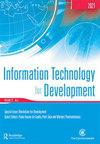Examining the health impact of elderly ICT use in China
IF 5.1
3区 管理学
Q1 DEVELOPMENT STUDIES
引用次数: 2
Abstract
ABSTRACT Information and communication technology (ICT) can play a prominent role in human development due to its significant health impact on elderly adults. Unlike previous research, which treats ICT use as a general concept, this study investigates two dimensions of ICT use (active and passive use), and it draws upon self-determination theory to explain the effects of ICT use on life satisfaction as well as health. Additionally, we explore the moderating effects of perceived isolation and ICT self-efficacy, on the relationship between ICT use and life satisfaction. We conducted a survey with 297 valid samples from elderly individuals in China to test our hypotheses. The results show that active ICT use can affect both life satisfaction and health status. We also found that, ICT self-efficacycan moderate the relationship between active/passive ICT use and life satisfaction. However, perceived isolation only moderates the relationship between passive ICT use and life satisfaction.研究中国老年人信息通信技术使用对健康的影响
摘要信息和通信技术对老年人的健康具有重要影响,在人类发展中发挥着重要作用。与以往的研究不同,以往的研究将信息和通信技术的使用视为一个一般概念,本研究调查了信息和通信科技使用的两个维度(主动使用和被动使用),并借鉴自决理论来解释信息和通信技术的使用对生活满意度和健康的影响。此外,我们还探讨了感知孤立和信息通信技术自我效能对信息通信技术使用和生活满意度之间关系的调节作用。我们对来自中国老年人的297个有效样本进行了调查,以检验我们的假设。结果表明,积极使用信息和通信技术可以影响生活满意度和健康状况。我们还发现,信息通信技术自我效能可以调节主动/被动信息通信技术使用与生活满意度之间的关系。然而,孤立感只会调节被动使用信息和通信技术与生活满意度之间的关系。
本文章由计算机程序翻译,如有差异,请以英文原文为准。
求助全文
约1分钟内获得全文
求助全文
来源期刊

Information Technology for Development
Multiple-
CiteScore
11.30
自引率
16.70%
发文量
34
期刊介绍:
Information Technology for Development , with an established record for publishing quality research and influencing practice, is the first journal to have explicitly addressed global information technology issues and opportunities. It publishes social and technical research on the effects of Information Technology (IT) on economic, social and human development. The objective of the Journal is to provide a forum for policy-makers, practitioners, and academics to discuss strategies and best practices, tools and techniques for ascertaining the effects of IT infrastructures in government, civil societies and the private sector, and theories and frameworks that explain the effects of IT on development. The concept of development relates to social, economic and human outcomes from the implementation of Information and Communication Technology (ICT) tools, technologies, and infrastructures. In addition to being a valuable publication in the field of information systems, Information Technology for Development is also cited in fields such as public administration, economics, and international development and business, and has a particularly large readership in international agencies connected to the Commonwealth Secretariat, United Nations, and World Bank.
 求助内容:
求助内容: 应助结果提醒方式:
应助结果提醒方式:


